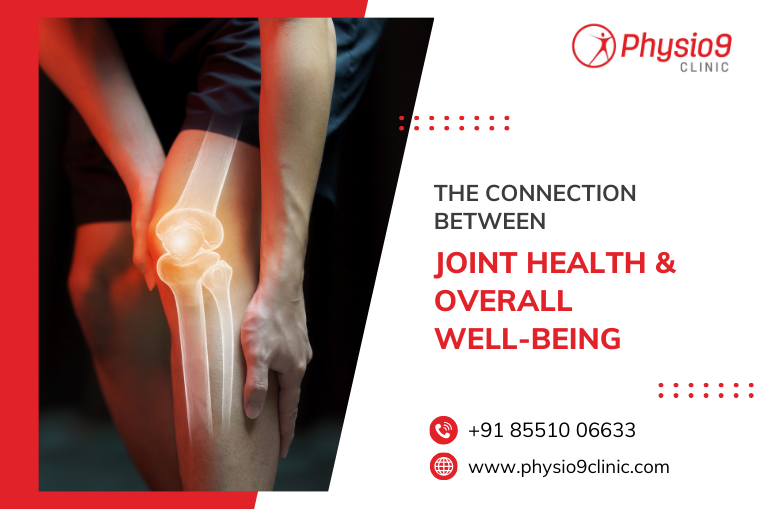You know that feeling when your knees start making sounds like an old door hinge every time you get up? Yeah, that’s your body reminding you that joint health isn’t something to take lightly. Whether climbing stairs, playing with your kids, or simply performing your daily routine, your joints play a crucial role in keeping you mobile and pain-free.
But here’s the thing—joint health isn’t just about movement; it’s deeply connected to your overall well-being.
Why Joint Health Matters More Than You Think
Most people think joint pain is something that happens only to grandparents who tell stories about the “good old days.” But the reality is, joint health is important for everyone—young adults, athletes, working professionals, and even teenagers glued to their phones in awkward positions.
Your joints connect your bones, provide support, and help you move. When they’re in trouble, everything from your daily comfort to your long-term mobility can be affected.
The Link Between Joint Health and Overall Well-being
Your body is like a well-oiled machine, and your joints are an essential part of that system. When they’re functioning properly, you feel more energetic, active, and ready to take on the world. But when they aren’t, it can lead to more than just physical discomfort.
Here’s how joint health impacts your overall well-being:
1. Joint Pain Can Affect Your Mental Health
Ever noticed how a small injury can mess with your mood? Constant joint pain can lead to stress, anxiety, and even depression. When simple tasks like walking or standing become difficult, frustration sets in. Studies have shown that people with chronic joint issues often experience higher levels of mental distress.
2. Poor Joint Health Can Reduce Mobility and Independence
Struggling to sit cross-legged during a family function?
Finding excuses to avoid long walks?
When joint health deteriorates, mobility takes a hit, making everyday activities more challenging. For seniors, this can mean losing independence and relying on others for basic tasks.
3. It Impacts Your Sleep Quality
Joint pain doesn’t believe in letting you rest peacefully. Tossing and turning at night due to discomfort can lead to poor sleep, which in turn affects your energy levels, immune system, and overall health.
Lack of sleep has also been linked to increased inflammation in the body, creating a vicious cycle of pain and discomfort.
4. Strong Joints Lead to Better Physical Fitness
Your joints and muscles work together to keep you active. Weak joints can discourage physical activity, leading to weight gain, reduced stamina, and even higher risks of conditions like diabetes or heart disease.
If you want to keep up with your kids, hit the gym, or dance at weddings without holding your back, taking care of your joints is non-negotiable.
How to Keep Your Joints Healthy
Now that we know how important joints are, the next question is—how do we take care of them? Here are some easy and practical tips:
1. Stay Active, But Don’t Overdo It
Movement keeps your joints healthy, but excessive strain can do more harm than good. Low-impact exercises like swimming, yoga, and cycling help keep joints strong without putting too much pressure on them.
2. Maintain a Healthy Weight
Your knees already do enough heavy lifting—don’t make them work overtime. Excess weight increases pressure on the joints, especially the knees and hips. Even a small weight loss can make a big difference in reducing joint pain.
3. Eat a Joint-Friendly Diet
What you eat plays a huge role in joint health. Anti-inflammatory foods like turmeric (hello, haldi doodh!), green leafy vegetables, nuts, and omega-3-rich fish can help keep your joints happy. On the other hand, excessive sugar and processed foods can contribute to inflammation.
4. Strengthen the Muscles Around Your Joints
Strong muscles provide better support to your joints. Strength training exercises focusing on your legs, core, and back can help keep your joints stable and reduce strain.
5. Don’t Ignore Minor Discomfort
That slight knee pain or stiffness you’re feeling? It’s better to address it now rather than wait for it to turn into a full-blown problem. If you experience persistent joint pain, stiffness, or swelling, seeking professional help can prevent long-term issues.
Visiting the orthopedic rehabilitation center can help you improve your joint functions and reduce pain through guided therapy and exercises. If you are looking for a trusted clinic for orthopedic rehabilitation in Pune, book an appointment with our expert at Physio9.
The Role of Professional Care in Joint Health
Sometimes, home remedies and lifestyle changes aren’t enough. That’s where expert care comes in. Orthopedic specialists and rehabilitation programs offer personalized treatment plans to restore joint function and improve mobility. Physiotherapy, hydrotherapy, and targeted exercises can make a significant difference in managing joint pain effectively.
Your Joints, Your Responsibility
Think of your joints as lifelong partners—they support you, so it’s only fair that you take care of them too. Whether it’s making small lifestyle changes, eating the right foods, or seeking professional help, every step counts. Prioritizing joint health today can help ensure a future where you move freely, comfortably, and without limitations.
To learn more, book an appointment with our expert at Physio9 for orthopedic rehabilitation in Pune.







